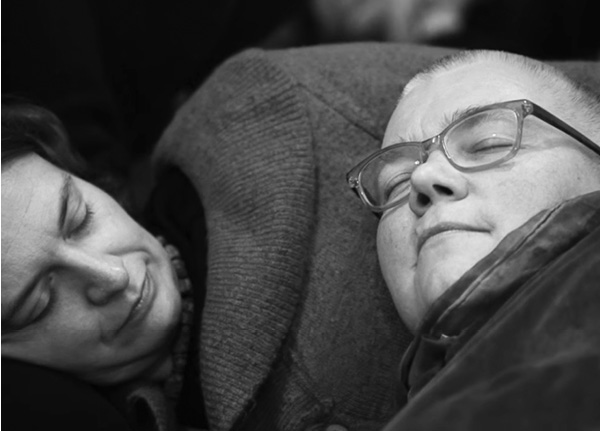
THE ASYLUM PROJECT
first performed on February 5, 2016
LightBox, Detroit, MI
performed three times in 2016
THE OLIMPIAS
Petra Kuppers, Stephanie Heit
Ann Arbor, MI / Ypsilanti, MI
979949583p979949583e979949583t979949583r979949583a979949583@979949583u979949583m979949583i979949583c979949583h979949583.979949583e979949583d979949583u
olimpias.org
THE ASYLUM PROJECT
THE OLIMPIAS
How do you feel safe? What is home? Who do you welcome? How do we create sanctuary for one another?
In the aftermath of the 2016 Japanese hate crime against institutionalized and disabled people, the killings of queer Latinx dancers at the Pulse nightclub in Orlando, and many more attacks in public space around the world, all of us are called upon to create positive space—to support those whose vitality is compromised by injustice.
Our performance inquiries in public spaces in Detroit, Belgium, the Netherlands, and Norway explored multiple meanings of the term “asylum”; from asylum seekers to psychiatric asylums, from queer sanctuary space to temporary places of security and refuge in public.
All actions incorporated companionship, physical engagement (with multiple options of involvement or witnessing) and writing. In the sessions, people entered a circle and shared their initial associations with the word ‘asylum,’ exploring the many valences of the word. Actions included listening to the performance site, exploring the infrastructures of the particular building (heating vents, air conditioning, windows, corridors), leaning into other bodies, derives/driftings, and sensory walks (with eyes closed, led by a partner). A final, collectively created social sculpture completed each performance event: bodies, sounds, sensations leaning into the site.
We led these actions as two disabled women. One, Stephanie Heit, with multiple experiences of psychiatric hospitalizations; the other, Petra Kuppers, as someone who shifted across national borders in order to find citizenship as a wheelchair user; both embracing different contemporary meanings of “queer/crip” poetics and politics. Our main agenda was to make contact and to explore together the shapes and feelings of international disability culture lives.